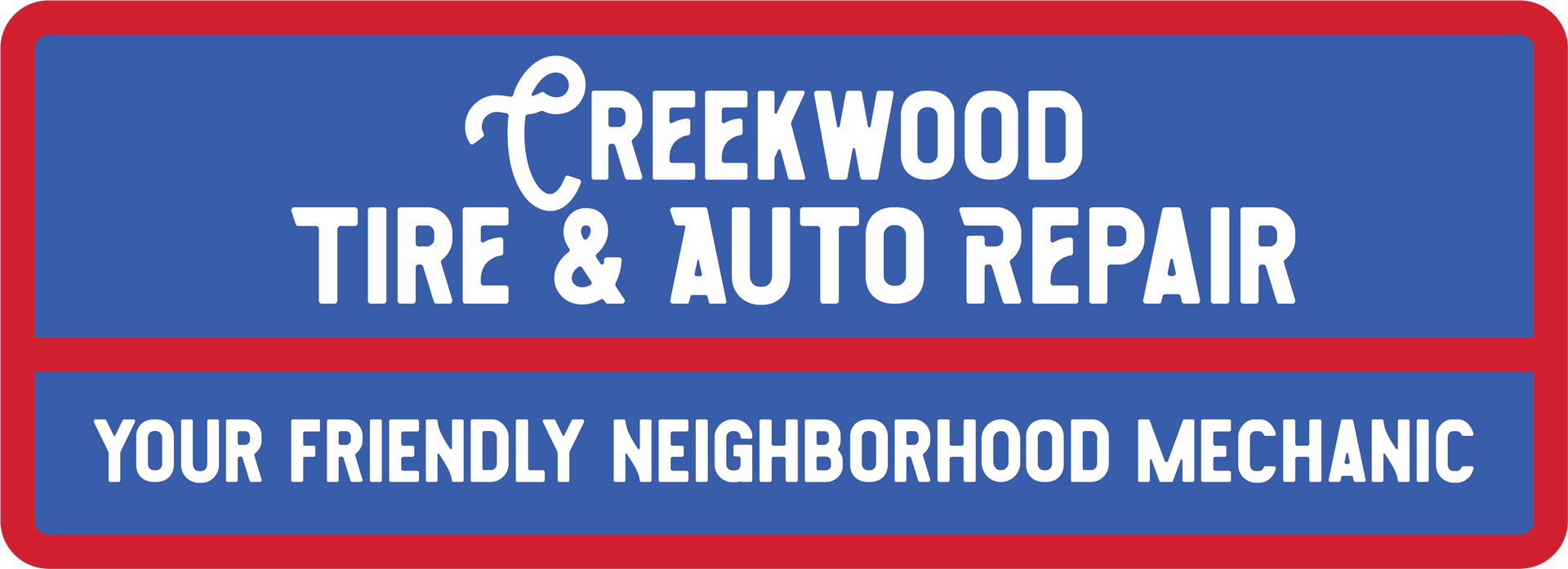BLOG
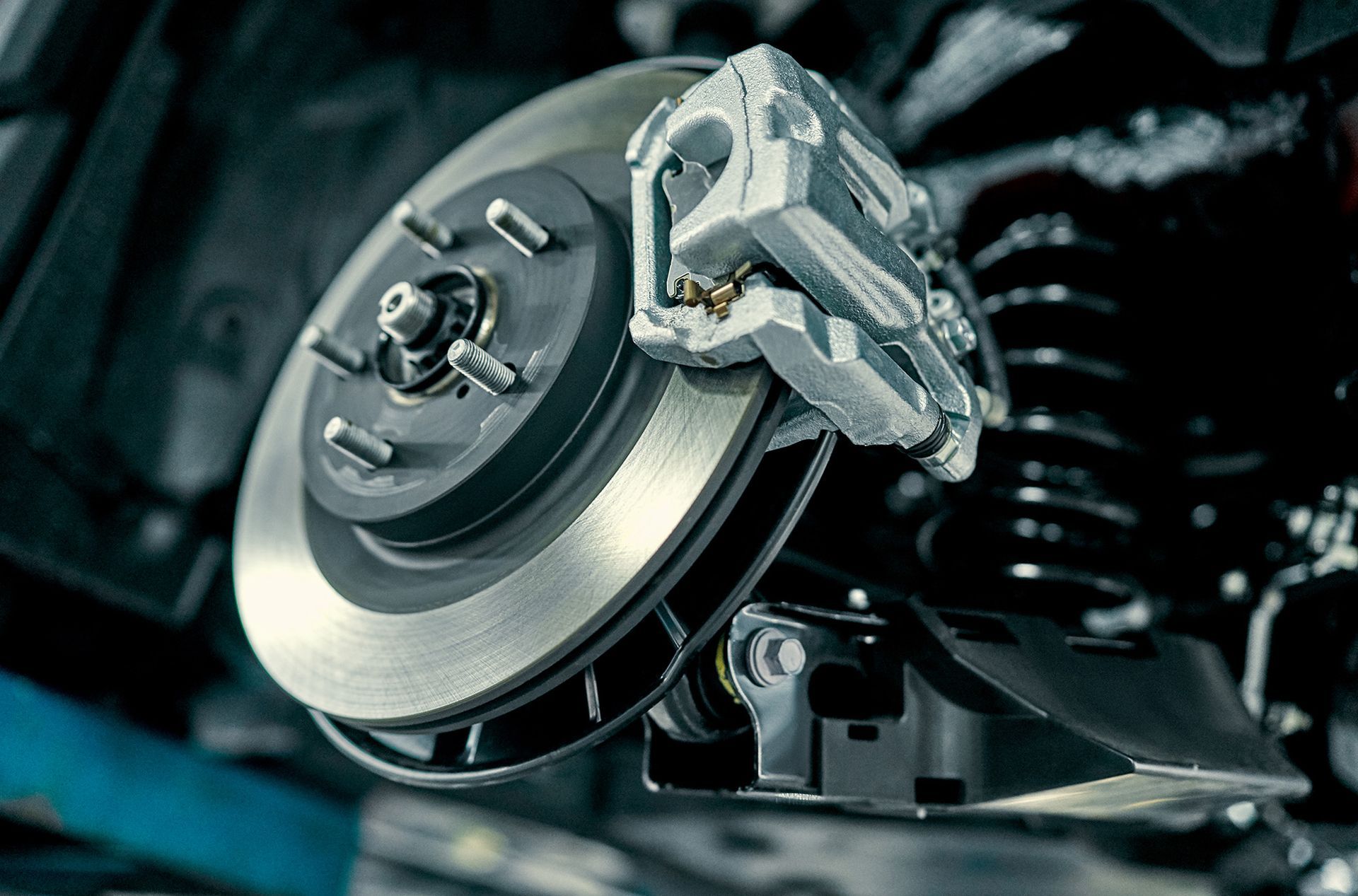
Brakes are one of those things you don’t want to ignore. At Creekwood Tire & Auto Repair, we see it all the time—people waiting until something feels really wrong before coming in for a brake inspection. The truth is, your brakes give you warning signs well before things get dangerous or expensive. The key is knowing what to look out for and acting early. If you’re in Lenoir City and wondering whether it’s time to get your brakes checked, here are six signs you should not ignore. 1. Squealing or Squeaking Noises This is often the first sign something’s going on. Brake pads are designed to make a high-pitched squeal when they start to wear down. It’s your car’s built-in reminder to schedule service. If you’re hearing this sound consistently, it’s time to bring your vehicle in. We’ll inspect your brake pads and rotors and let you know exactly what shape they’re in. 2. Grinding Sounds When Braking If you’re hearing a grinding noise, that usually means the brake pads are worn all the way down and metal is rubbing against metal. This can damage your rotors and lead to a much more expensive repair. Grinding is not normal and it should be addressed immediately. At Creekwood, we’ll take a close look and let you know if we can resurface the rotors or if replacements are needed. 3. Vibration in the Brake Pedal or Steering Wheel A pulsing or vibrating brake pedal is often a sign of warped rotors. This can happen over time from excessive heat or wear. It not only affects your stopping distance, but it also puts added stress on your suspension. We use advanced diagnostic equipment to measure rotor thickness and check for runout. If your rotors are uneven, we’ll recommend the best solution to keep your braking smooth. 4. Brake Warning Light Is On If your dashboard brake light turns on, it could mean several things—low brake fluid, worn brake pads, or a problem with the braking system itself. It’s not something to guess about. Bring it in and we’ll hook up diagnostics to see what triggered the light. If it’s something minor, we’ll get it fixed fast. If it’s something more serious, we’ll explain what’s going on and what needs to happen next. 5. Car Pulling to One Side When Braking This usually means the brake system is not applying pressure evenly. It could be a stuck caliper, uneven brake pad wear, or an issue with the hydraulic system. If your car pulls left or right when you brake, that’s not something you should have to live with. It’s also a safety concern. Our team can inspect and rebalance the system so your vehicle stops straight and safely. 6. Soft or Spongy Brake Pedal A soft pedal that sinks too far or feels spongy is often a sign of air in the brake lines or a problem with the brake fluid. It could also indicate a master cylinder issue. Any time the pedal doesn’t feel firm and responsive, it’s time for service. We’ll check the entire hydraulic system, flush and replace brake fluid if needed, and restore the firmness of your brake pedal. Why Creekwood Is the Right Place for Brake Repair We’re not just here to patch things up. We do the job right. Our ASE-certified technicians use high-quality brake pads and parts that meet or exceed manufacturer standards. We also use modern diagnostic tools to ensure your braking system is working the way it should—no guesswork, just clear answers. We handle brake services for a wide range of vehicles, including both domestic and foreign makes. From Toyota and Ford to BMW and Mercedes-Benz, we’re equipped to handle it all. Don’t Wait for It to Get Worse Brakes don’t fix themselves. Waiting too long can lead to bigger repairs, more expensive parts, and unsafe driving conditions. If any of these signs sound familiar, we’re here to help. Call Creekwood Tire & Auto Repair or schedule an appointment online today. We’ll inspect your brakes, walk you through the findings, and take care of the repairs with no surprises. Safety is too important to put off.
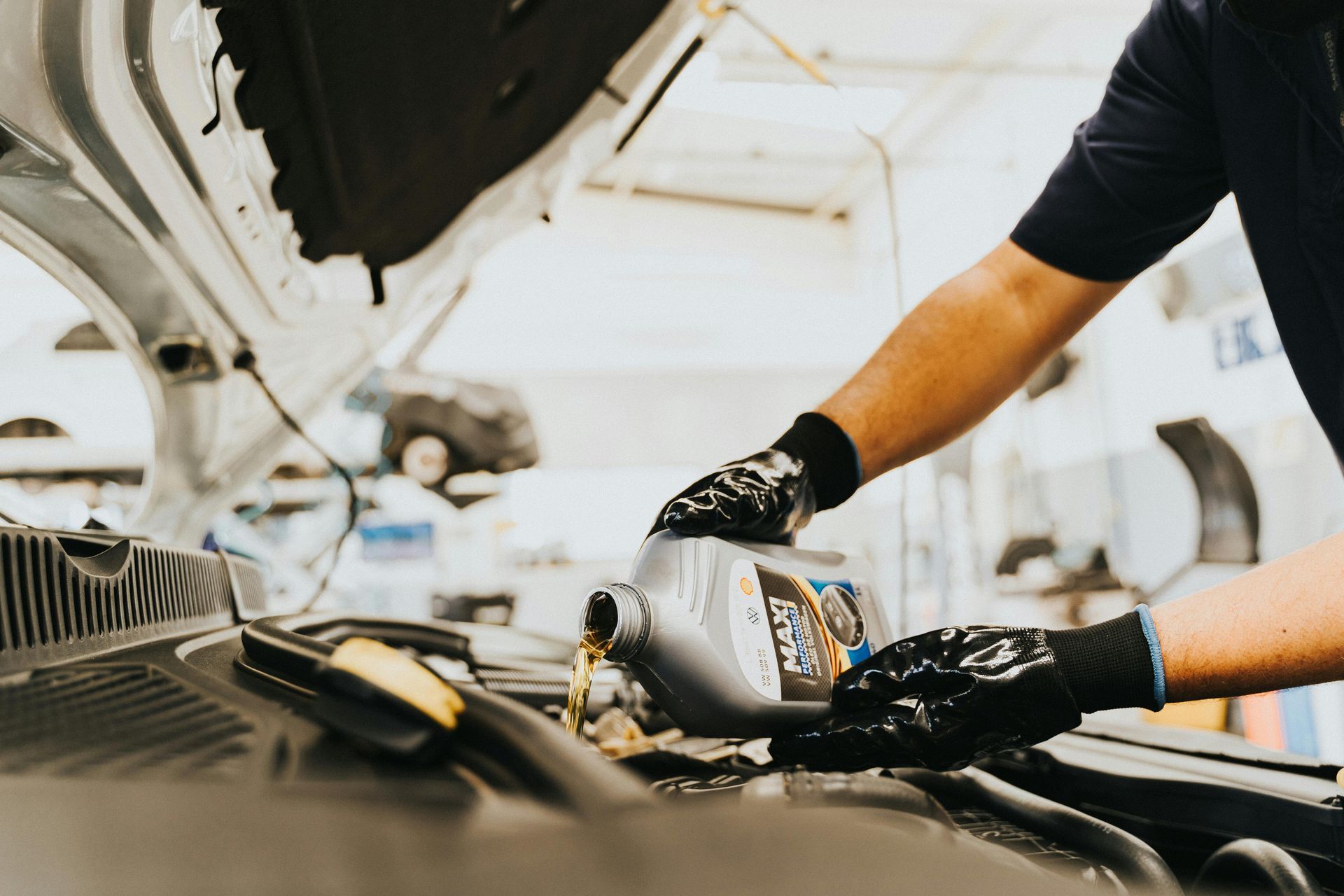
It’s easy to forget about an oil change until your dashboard light reminds you. You’re busy. The car still runs fine. Maybe you’ll get to it next week. But the truth is, waiting too long for an oil change can quietly take a toll on your engine. At Creekwood Tire & Auto Repair, we want to help you avoid expensive engine repairs by keeping up with something simple and effective—routine oil changes. Let’s talk about why they matter more than most drivers realize. What Oil Actually Does for Your Vehicle Motor oil is the lifeblood of your engine. It keeps everything moving smoothly, reduces friction, carries away heat, and prevents sludge buildup. Over time, oil breaks down and loses its ability to protect your engine. Dirt, fuel residue, and moisture start to contaminate it, and that’s when engine wear can start happening. Even if your car seems to run fine, dirty or old oil can be silently damaging components under the hood. That’s why staying on schedule for oil changes is one of the best ways to extend the life of your vehicle. Not All Oil Is Created Equal At Creekwood, we use Schaeffer’s full synthetic oil , which is engineered to last up to 10,000 miles between changes. This is not the same stuff you find at a quick lube shop. Schaeffer’s oil is known for its superior thermal stability and engine protection. That means fewer deposits, better lubrication, and better performance even under extreme temperatures. So while some places might try to get you in and out with the cheapest oil possible, we focus on giving your engine what it actually needs to run at its best. Synthetic Oil vs. Conventional Oil: What’s the Difference? Here’s a quick breakdown: Synthetic oil is made through a more advanced refining process, giving it better purity and performance. It lasts longer, flows better in cold weather, and protects against engine wear more effectively. Conventional oil works fine for basic needs, but it breaks down faster and doesn’t offer the same long-term protection. If you want peace of mind and fewer oil changes throughout the year, synthetic is the way to go. And with Schaeffer’s high-end formulation, you are getting some of the best protection available. How Skipping Oil Changes Costs You More Neglecting regular oil changes can lead to more than just dirty oil. It can result in: Engine overheating Poor fuel economy Sluggish performance Permanent internal damage that leads to costly repairs or full engine replacement An oil change costs far less than any of those issues. It is one of the simplest ways to avoid major problems and keep your car running reliably. How We Handle Oil Changes at Creekwood When you bring your car to us for an oil change, you’re not just getting fresh oil and a new filter. Our ASE-certified technicians take the time to check for leaks, inspect fluid levels, and do a visual check under the hood. We treat every visit as an opportunity to help you stay ahead of problems. We also offer tire checks and rotation, and we’ll let you know if we spot anything else worth looking into. Our goal is not to sell you something you don’t need. It’s to keep your car in great shape so you can stay safe on the road. Why Lenoir City Drivers Trust Us We’re proud to be a local shop that delivers dealership-level quality without the dealership price tag. We use top-tier parts, offer straightforward service, and take the time to explain what we’re doing and why it matters. Our team is here Monday through Friday, and we work with a wide range of domestic and foreign vehicles. Whether you drive a Honda, Ford, BMW, or Toyota, we’re ready to help you take care of it. Ready for Better Oil Change Service? If it’s been a while since your last oil change or you’re just not sure when you’re due, we can help. Schedule an appointment at Creekwood Tire & Auto Repair and let us take care of the rest. We’ll make sure your engine is protected, your fluids are in good shape, and you leave confident in your vehicle. Call us today or book your next oil change online. We’ll keep you running smooth without the stress.
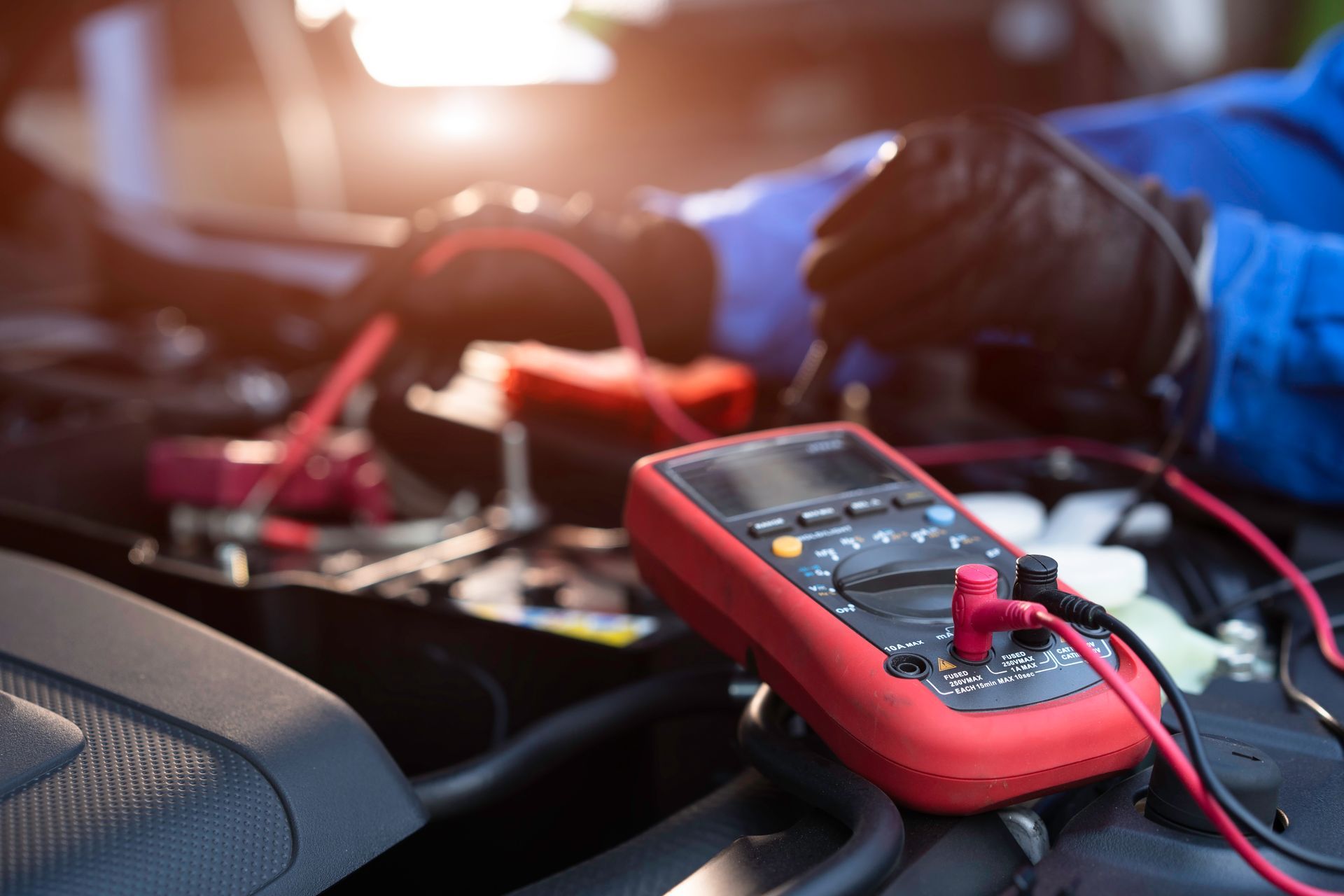
Car batteries represent one of the most neglected aspects of vehicle maintenance despite their critical role in vehicle reliability. At Creekwood Tire & Auto Repair in Lenoir City, we frequently encounter customers facing battery-related problems that simple preventive maintenance could have prevented. Tennessee's challenging climate conditions, featuring hot humid summers and cold winters, significantly accelerate battery deterioration. Understanding proper battery maintenance, climate impact factors, and early warning signs will help prevent unexpected breakdowns and extend battery life. Why Regular Battery Maintenance Matters Your vehicle's battery powers the ignition system, all electrical components, and onboard computer systems. Without proper battery function, your car cannot start or operate correctly. While modern batteries typically last three to five years, environmental factors like extreme heat, vibration, and inadequate charging can dramatically reduce their lifespan. Waiting until complete battery failure creates unnecessary risk. Failing batteries usually provide advance warning signs, and recognizing these early indicators prevents being stranded in inconvenient locations. Tennessee Weather Effects on Battery Performance Summer Heat Damage Tennessee's intense summer heat accelerates battery fluid evaporation. This process causes internal component damage and terminal corrosion. Even apparently functional batteries suffer gradual weakening from extreme heat exposure, resulting in reduced battery life and unreliable starting performance. Winter Cold Weather Stress Cold temperatures slow internal chemical reactions, making it difficult for batteries to generate sufficient charge for engine starting. Batteries previously weakened during summer months often fail completely during the first significant cold weather event. Temperature Fluctuation Impact Rapid temperature changes from hot to cold cause battery casings to expand and contract, increasing crack and leak risks. Tennessee's characteristic pattern of hot afternoons followed by cool mornings creates additional battery stress during spring and fall transition periods. Battery Warning Signs Requiring Attention Recognizing early warning indicators helps prevent sudden vehicle breakdowns. Schedule professional battery testing at Creekwood Tire & Auto Repair if you notice slow engine cranking during startup, dimming headlights while idling, lagging or intermittent electrical accessories including windows, radio, or air conditioning, illuminated battery warning lights on your dashboard, swollen or distorted battery case appearance, or visible terminal corrosion. Address these symptoms promptly rather than waiting for complete battery failure. These indicators typically signal declining battery performance or approaching end of service life. Battery Life Extension Strategies Proper battery maintenance prevents unexpected failures through simple preventive measures. Regular terminal cleaning prevents corrosion buildup that interrupts electrical connections. Clean terminals using wire brushes and baking soda solution, or schedule professional cleaning during routine service appointments. Ensure proper battery mounting to prevent vibration damage to internal components. Professional installation includes secure mounting and proper cable tightening. Minimize frequent short trips that prevent alternators from fully recharging batteries. Occasional longer drives help maintain proper battery charge levels. Develop habits to prevent accessory drain by checking that headlights and interior lights are off before leaving your vehicle. Schedule regular battery testing during oil changes or seasonal inspections for early problem detection and peace of mind. Battery Replacement Guidelines Even with excellent maintenance, batteries have finite service lives. Begin annual testing once batteries reach three years of age. Tennessee's climate conditions typically reduce average battery life to approximately three years. Replace batteries that fail professional testing, require repeated jump-starting, exceed warranty periods while showing weakness signs, or display fluid leaks or case swelling. Professional assessment helps determine battery condition and replacement timing. Creekwood stocks trusted battery brands and provides complete on-site installation services. Charging System Component Roles Your battery functions as part of a complete electrical system including the alternator, drive belts, and voltage regulator. These components work together to charge the battery during vehicle operation. Repeated battery failures after jump-starting often indicate problems with these related components rather than the battery itself. Complete electrical system diagnostics ensure proper battery charging and identify underlying issues that could cause premature battery failure. Professional Battery Service Advantages Creekwood Tire & Auto Repair provides comprehensive vehicle care backed by 24-month, 24,000-mile warranties. ASE-certified technicians perform battery testing, terminal cleaning, and charging system inspection during single service visits. Additional service benefits include same-day completion for most repairs, comfortable customer waiting areas with Wi-Fi access, text and email vehicle status updates, after-hours drop-off convenience, and local shuttle service availability. These services make battery maintenance convenient and accessible for Lenoir City area drivers. Schedule Professional Battery Inspection Whether your vehicle shows performance issues or you prefer proactive seasonal maintenance, quick battery inspection saves time and money long-term. Creekwood Tire & Auto Repair helps you maintain reliable vehicle power throughout all seasons. Schedule appointments online or by phone for comprehensive battery testing and Tennessee weather preparation. Professional service keeps your vehicle ready for any weather conditions Tennessee presents.
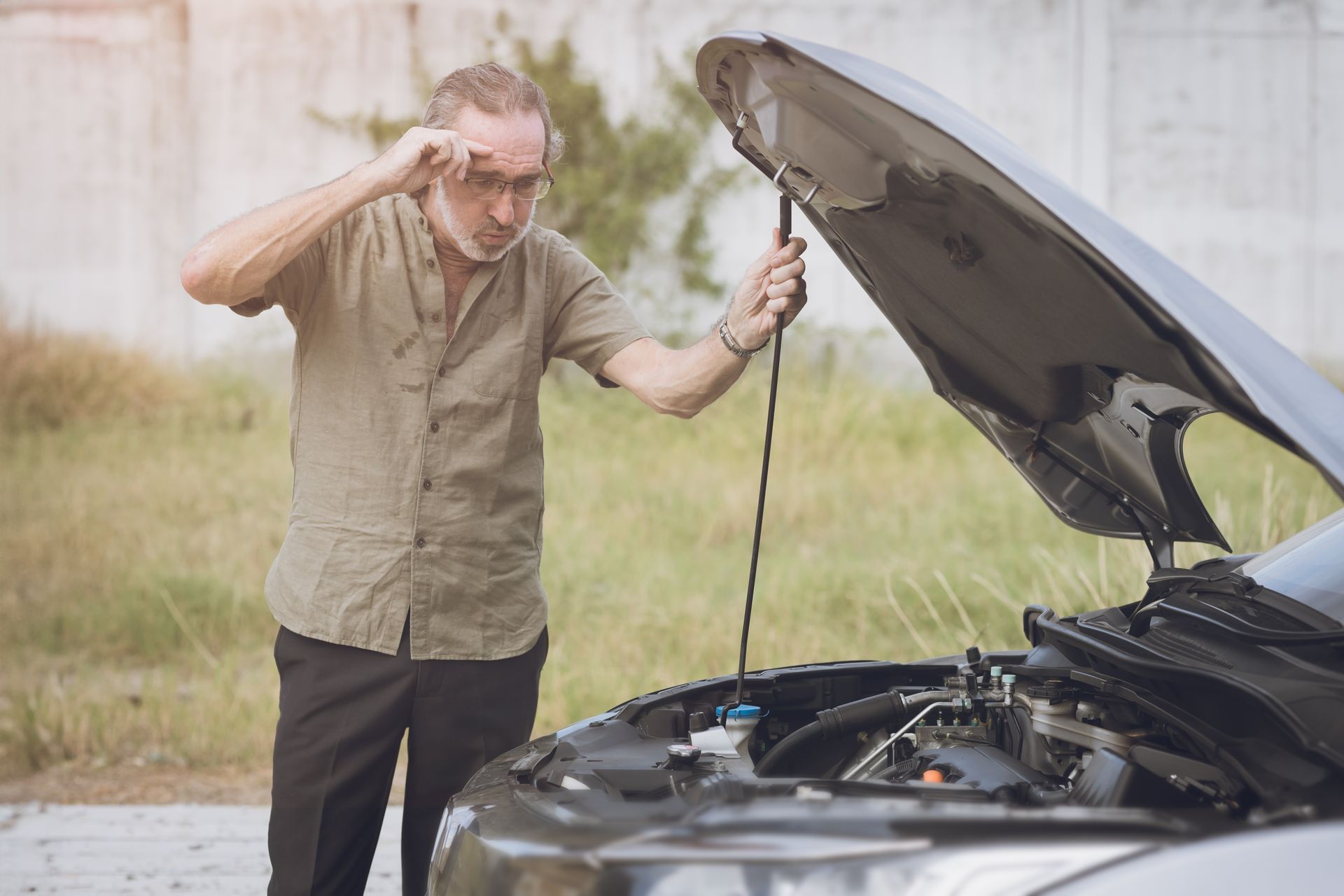
Tennessee summers bring intense heat and humidity that can severely impact your vehicle's performance and longevity. At Creekwood Tire & Auto Repair in Lenoir City, we consistently see increased heat-related vehicle problems during summer months. Most of these costly repairs can be prevented through proper preparation and regular maintenance. Understanding how extreme heat affects your vehicle and taking preventive action will keep you safely on the road whether you're commuting locally or traveling through the Smoky Mountains. Engine Cooling System Challenges in High Heat Your engine generates substantial heat during normal operation. When outside temperatures exceed 90 degrees with high humidity, your engine must work significantly harder to maintain proper operating temperature. An inadequately functioning cooling system dramatically increases overheating risk. Critical cooling system components to inspect include radiator fluid level and condition, all cooling system hoses for cracks or bulging, radiator cap seal integrity, and water pump area for potential leaks. Your cooling system becomes absolutely critical when temperatures spike. Schedule a comprehensive cooling system diagnostic if you cannot recall your last inspection. Summer Battery Failure Risks While many drivers associate battery problems with winter weather, summer heat creates equally challenging conditions. Excessive heat causes battery fluid evaporation, leading to terminal corrosion and significantly reduced battery lifespan. Watch for these battery warning signs: slow engine cranking, visible corrosion around battery terminals, swollen or distorted battery case, and electrical system issues like dimming lights or sluggish power windows. Batteries older than three years should undergo professional testing. Quick battery testing and replacement recommendations are available at our Lenoir City location. Tire Safety in Extreme Heat Summer tire blowouts occur more frequently due to underinflated or worn tires combined with extreme pavement temperatures. As road surface temperatures increase, tire pressure rises correspondingly. Improperly inflated tires facing additional heat stress can fail catastrophically at highway speeds. Monitor tire pressure monthly minimum, inspect tread depth and overall wear patterns, examine sidewalls for damage or dry rot, and identify uneven wear indicating potential alignment problems. Proper tire maintenance extends tire life, improves fuel efficiency, and enhances road safety. Rotate tires every 6,000 to 8,000 miles and increase pressure monitoring frequency during summer months. Air Conditioning System Performance Your vehicle's air conditioning system contains multiple components that can deteriorate, develop leaks, or lose efficiency over time. Constant summer usage accelerates wear on these systems. If your vehicle takes excessive time to cool or air temperature seems insufficient, schedule inspection before peak summer heat arrives. Professional inspection covers refrigerant levels, compressor operation, leak detection, and airflow assessment. Fluid Degradation in High Temperatures Heat accelerates the breakdown of essential vehicle fluids including engine oil, transmission fluid, brake fluid, and coolant. Low or contaminated fluids significantly increase mechanical failure risk. Regularly check and replace engine oil, coolant, transmission fluid, power steering fluid, brake fluid, and windshield washer fluid as needed. Maintaining proper fluid levels and condition represents one of the most cost-effective ways to prevent expensive repairs. Brake System Heat Stress Your braking system also suffers from heat exposure. Stop-and-go summer traffic or mountain driving creates additional heat stress on brake pads and rotors. Overheated brakes experience reduced stopping power and dangerous brake fade. Warning signs include squeaking or grinding noises during braking, increased stopping distances, soft or spongy brake pedal feel, and steering wheel vibration when braking. Address brake issues immediately rather than waiting for complete failure. Early inspection at Creekwood Tire & Auto Repair identifies problems before they become safety hazards. Cabin Air Filter Importance Summer pollen and dust quickly clog cabin air filters. Dirty filters reduce airflow, force air conditioning systems to work harder, and create unpleasant interior odors. Cabin air filter replacement is simple and inexpensive maintenance that dramatically improves driving comfort. If you cannot remember your last replacement, schedule an inspection. Pre-Trip Vehicle Inspection Summer travel plans require thorough pre-trip vehicle inspection to avoid roadside emergencies. ASE-certified technicians should examine fluid levels, tire condition, brake system operation, battery health, air conditioning functionality, and run engine diagnostics. Professional inspection provides peace of mind even when everything appears normal. Preventing vacation breakdowns is worth the investment in preventive maintenance. Dashboard Warning Light Response Summer heat can trigger or worsen existing problems that activate dashboard warning lights. Never ignore check engine lights, ABS warnings, or low tire pressure indicators, especially during hot weather. Diagnostic testing quickly identifies underlying issues requiring attention. Complete Summer Vehicle Maintenance Checklist Essential summer vehicle maintenance includes coolant level and condition verification, battery strength testing, tire pressure and tread inspection, engine oil and fluid level checks, brake system health assessment, air conditioning performance evaluation, cabin air filter inspection, windshield wiper and washer fluid verification, and diagnostic code scanning for dashboard warnings. Schedule Professional Summer Maintenance Creekwood Tire & Auto Repair keeps Lenoir City area drivers safe and comfortable throughout Tennessee summers. Our comprehensive services include seasonal inspections, fluid system maintenance, tire services, and complete peace of mind solutions. Contact us today to schedule your appointment and stay ahead of summer heat challenges. When temperatures rise, your vehicle deserves professional care to maintain spring-like performance and reliability.
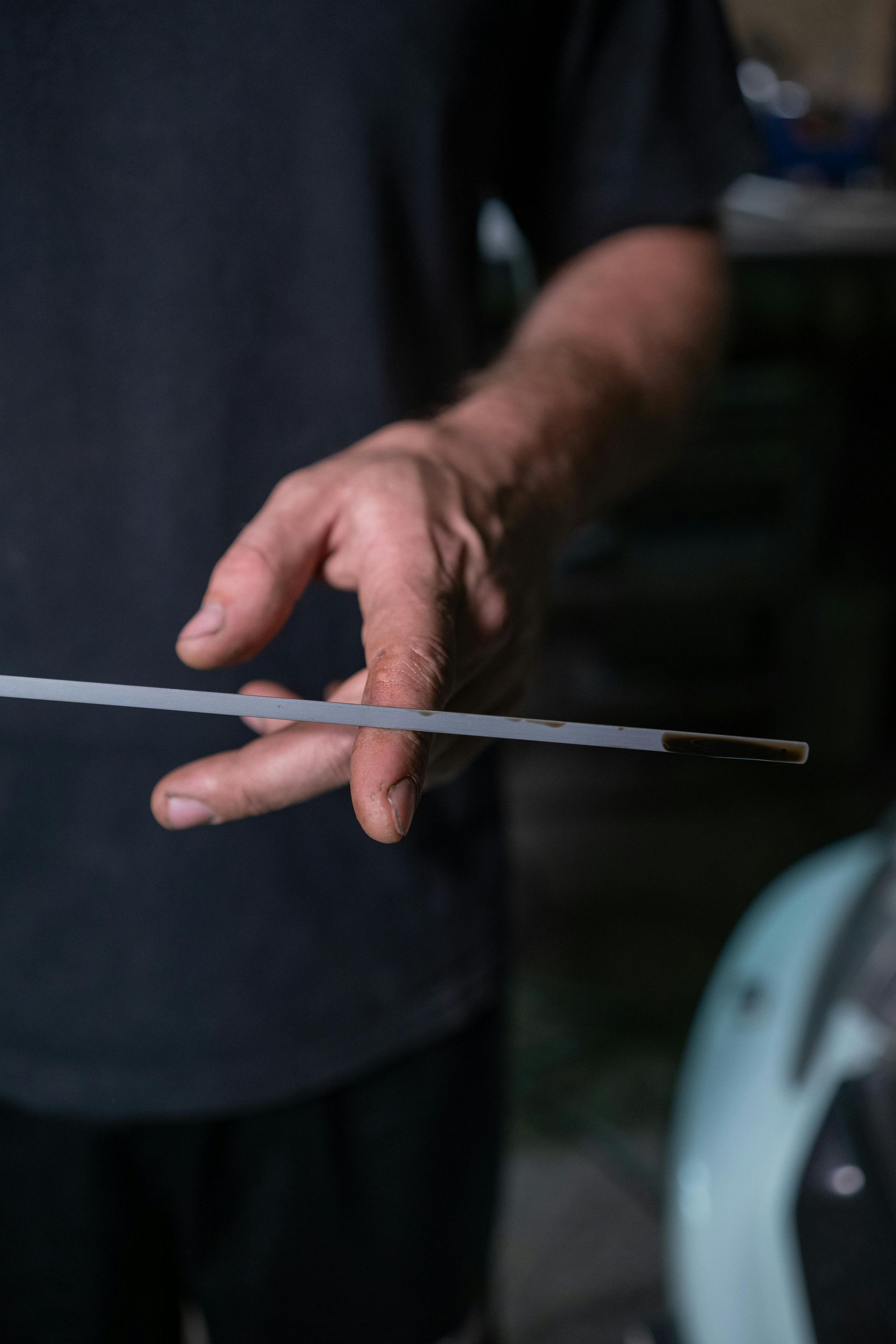
Tune-ups used to be something every car needed like clockwork. These days, with modern vehicles and onboard computers, a lot of drivers think tune-ups aren’t necessary anymore. But the truth is, regular tune-ups still play a big role in keeping your engine running efficiently and reliably—especially as your vehicle racks up mileage. At Creekwood Tire & Auto Repair in Lenoir City, we perform modern tune-up services that are tailored to today’s vehicles. Whether your car’s acting up or you’re just staying ahead of maintenance, a tune-up can make a big difference in performance, fuel economy, and long-term reliability. What a Tune-Up Includes Today A modern tune-up isn’t just about spark plugs. It’s a combination of checks, replacements, and adjustments based on your vehicle’s mileage, condition, and driving habits. Typical tune-up services may include: Replacing spark plugs and wires or coils Checking and cleaning fuel injectors Replacing air and cabin filters Inspecting ignition components Testing battery and charging system Verifying engine sensors and emissions performance Inspecting belts, hoses, and fluid levels Every vehicle is a little different, so we look at your manufacturer’s recommended schedule and inspect for any signs of wear or performance issues. Why Tune-Ups Still Matter Even though your car’s computer handles a lot of adjustments, parts still wear out. Spark plugs lose efficiency, filters clog, and sensors start to read less accurately. A tune-up helps: Improve fuel efficiency Restore power and throttle response Reduce emissions Prevent breakdowns caused by worn parts Extend engine life by reducing stress on key systems If your engine feels like it’s lost some pep, or if your gas mileage has dropped, a tune-up may be exactly what it needs. Common Signs You Might Be Due It’s not always obvious, but these are signs your vehicle could benefit from a tune-up: Engine misfires or rough idling Sluggish acceleration Decreased fuel mileage Trouble starting Check engine light coming on Hesitation when accelerating Even if everything seems fine, if it’s been 30,000 miles or more since your last tune-up, it’s smart to have it checked. How Often Should You Schedule a Tune-Up? There’s no one-size-fits-all answer. Some newer cars can go 100,000 miles between certain services, while others need more frequent attention. The best approach is to follow your owner’s manual and have your vehicle inspected regularly. If your driving includes frequent short trips, idling in traffic, towing, or mountain roads, your car may need service sooner than the standard interval. What to Expect at Creekwood When you come in for a tune-up, we don’t just swap out a few parts and call it done. We take time to inspect your engine systems thoroughly, explain what we find, and prioritize what needs attention now versus what can wait. If everything looks good, we’ll tell you. If something’s worn out or causing performance issues, we’ll show you what it is and how it affects your vehicle. You’ll always get a clear picture of your engine’s health. Final Thoughts Tune-ups might not look like they used to, but they’re still one of the best ways to keep your engine running like it should. Whether you’re chasing better gas mileage or just want to avoid unexpected repairs, a routine check can go a long way. Bring your vehicle to Creekwood Tire & Auto Repair in Lenoir City and let us help you keep things running strong—season after season.
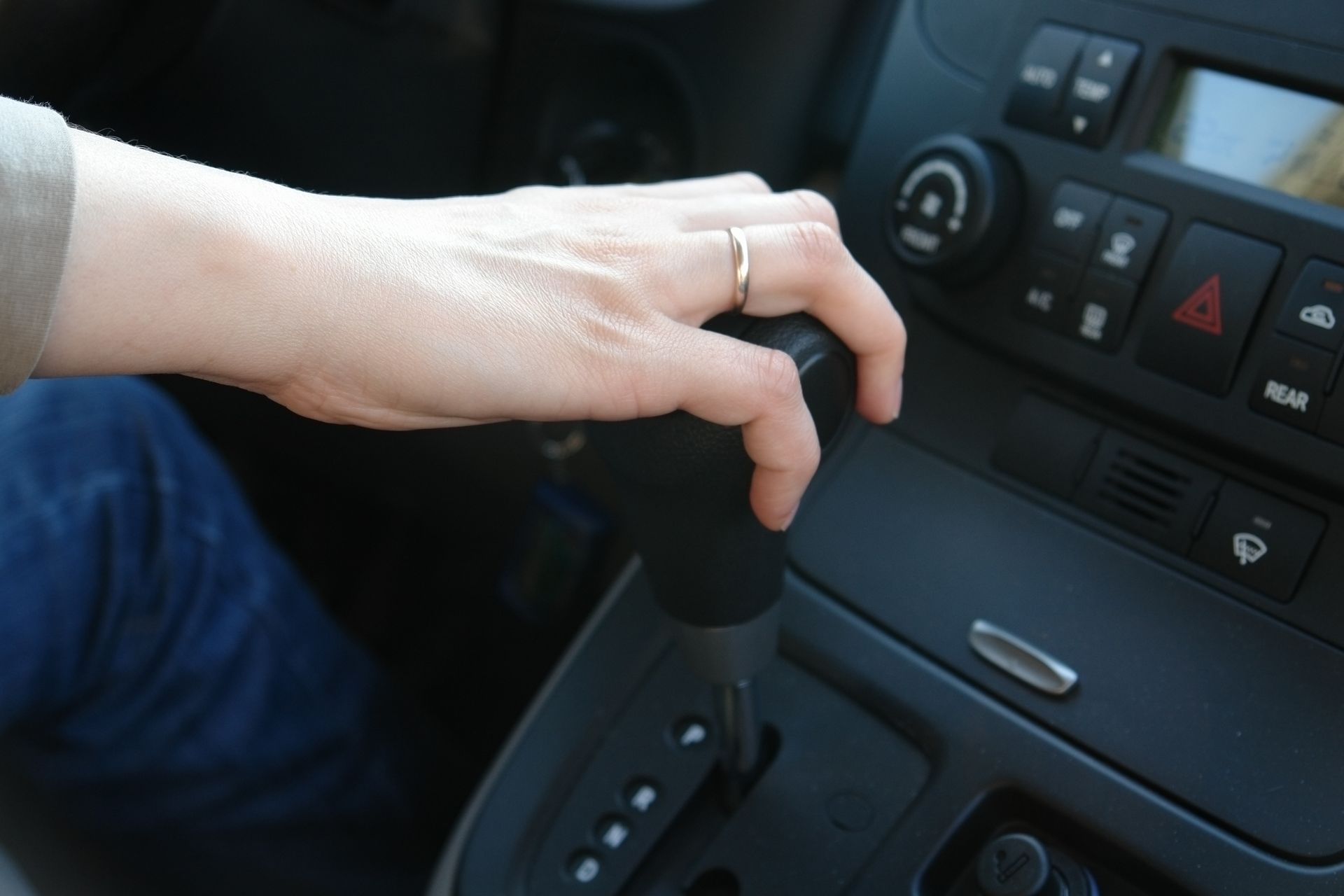
Transmission repairs aren’t something anyone wants to deal with—but catching problems early can save a lot of time, stress, and money. A transmission that’s slipping, jerking, or leaking doesn’t fix itself. In fact, waiting too long often leads to more expensive repairs or even full replacement. At Creekwood Tire & Auto Repair in Lenoir City, we help drivers spot transmission problems early and keep things running smoothly with proper diagnosis and repair. If something feels off, getting it looked at now can make a big difference later. What the Transmission Does Your vehicle’s transmission controls how power moves from the engine to the wheels. Whether you drive an automatic or manual, the transmission is responsible for shifting gears and making sure your vehicle accelerates and runs efficiently. When it starts to fail, you’ll usually notice performance issues first—even before the check engine light comes on. Early Signs of Transmission Trouble Here are the most common red flags to watch for: Delayed shifting or hesitation when accelerating Slipping gears or unexpected gear changes Burning smell after driving Fluid leaking under the vehicle Whining, clunking, or grinding noises Transmission warning light or check engine light Shaking or jerking when shifting Even if your car still moves and drives, any of these symptoms can mean the transmission isn’t working like it should. Getting it checked early can prevent further damage. Don’t Ignore Transmission Fluid Leaks One of the easiest problems to catch is a fluid leak. Transmission fluid is usually red or pink and has a slightly sweet smell. If you’re noticing puddles or drips under your vehicle—especially toward the middle or front—get it looked at right away. Low or dirty fluid is one of the top causes of early transmission wear. Replacing fluid and fixing leaks early on can extend the life of the system. Why Transmission Problems Get Expensive Fast Transmissions are complex, and once parts inside start breaking down, it affects the whole system. What could have been fixed with a fluid flush or sensor replacement can turn into a full rebuild or replacement if left too long. That’s why timing matters. The sooner you bring the vehicle in, the more options you have—and the lower the cost tends to be. What Creekwood Can Do When you bring your vehicle to Creekwood, we’ll start with a full diagnostic check. That includes scanning for transmission-related trouble codes and doing a hands-on inspection. We’ll: Check fluid level and condition Look for leaks or damage Monitor how your transmission shifts during a road test Inspect transmission mounts and related systems From there, we’ll give you a straight answer—whether it’s a simple repair or something more involved. If your vehicle needs a rebuild or replacement, we can also help you explore long-term solutions like JASPER remanufactured transmissions. Final Thoughts Transmission issues usually start small—but they never stay small for long. Paying attention to early signs and getting your vehicle checked quickly can make all the difference. If you’ve noticed shifting problems, leaks, or warning lights, don’t wait until the transmission fails completely. Bring your car to Creekwood Tire & Auto Repair in Lenoir City. We’ll help you catch the issue early, avoid unnecessary damage, and keep your vehicle running like it should.
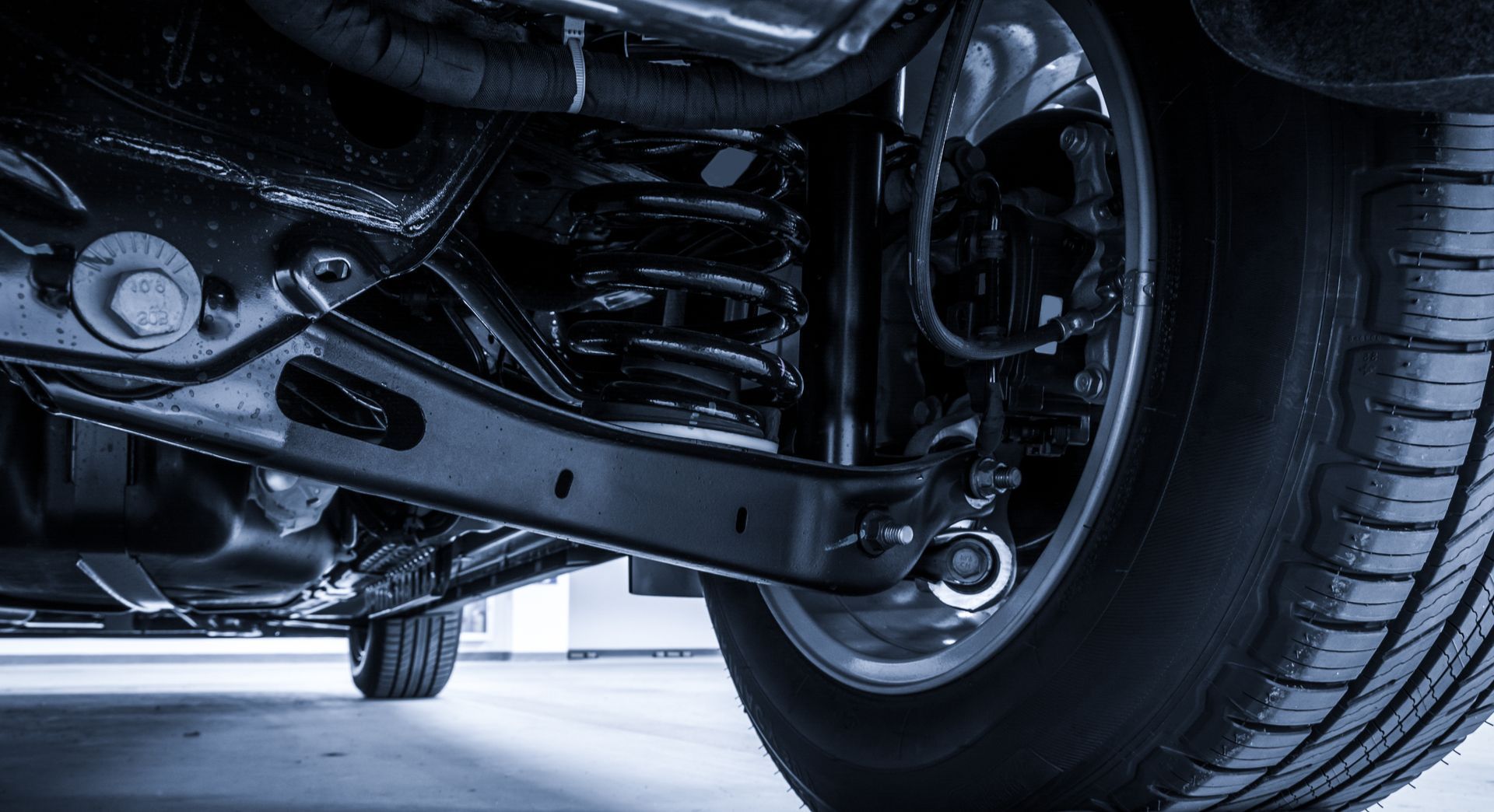
Your suspension system does more than keep the ride comfortable—it plays a key role in how your car handles, how your tires wear, and how safe your vehicle is on the road. If your suspension isn’t working the way it should, you’ll feel it—and ignoring those signs can lead to bigger problems fast. At Creekwood Tire & Auto Repair in Lenoir City, we help drivers figure out when it’s time for suspension repairs and what to do to keep things driving smoothly and safely. What the Suspension System Actually Does Your vehicle’s suspension system includes shocks, struts, springs, bushings, and control arms. Together, these components absorb road impact, keep your tires in proper contact with the pavement, and help maintain stability during turns, stops, and uneven surfaces. When any part of this system starts to wear out, your car’s handling and stopping distance are affected. Common Signs of Suspension Problems You don’t need to be a mechanic to tell when something’s not right. If your vehicle is showing any of these symptoms, your suspension may need attention: Bouncing or swaying after hitting a bump A noticeable dip when braking Uneven or premature tire wear Clunking or rattling sounds while driving The car pulls or feels unstable during turns The ride feels rougher than normal Your steering wheel vibrates or feels loose Any of these signs can indicate worn shocks or struts, damaged bushings, or other issues with the suspension system. Even if the car still “drives,” the safety margin is reduced—and that’s not something to ignore. What Causes Suspension Wear Suspension parts are designed to handle a lot, but they don’t last forever. Factors that speed up wear include: Rough roads or frequent potholes Carrying heavy loads or towing regularly Older vehicles with high mileage Rust or corrosion from road salt in winter Normal aging of rubber and metal components Here in East Tennessee, uneven pavement and changing seasons can be tough on suspension parts. Regular inspections help catch issues before they affect your driving safety. Why Suspension Problems Affect More Than Comfort A worn suspension doesn’t just make your ride bumpy—it affects how quickly and evenly your car can stop. It also impacts traction, especially during wet weather or sharp turns. That means your tires may not be making solid contact with the road at all times, which reduces control. If your vehicle’s suspension is worn out, it could also throw off your alignment, leading to faster tire wear and more fuel consumption. When to Get It Checked If your car is showing signs of suspension wear or you’ve never had the system inspected, it’s a good idea to have it looked at—especially if you're planning road trips, have recently hit a curb or pothole, or are noticing steering or tire wear issues. Suspension checks are fast, and most repairs can be done without needing to replace the entire system. What We Do at Creekwood When you bring your vehicle in, we inspect your shocks, struts, springs, and all supporting parts. We’ll also check your tires and alignment to see how the suspension is affecting the rest of your vehicle. If repairs are needed, we’ll go over your options clearly—no pressure and no guesswork. If everything still looks good, we’ll let you know that too. Final Thoughts Suspension issues can creep up slowly, but they have a big impact on your safety, comfort, and tire life. If your car has been handling differently or you’re noticing extra noise or bounce, it’s worth getting checked. Bring your vehicle to Creekwood Tire & Auto Repair in Lenoir City and let our team keep your suspension solid and your drive smooth.
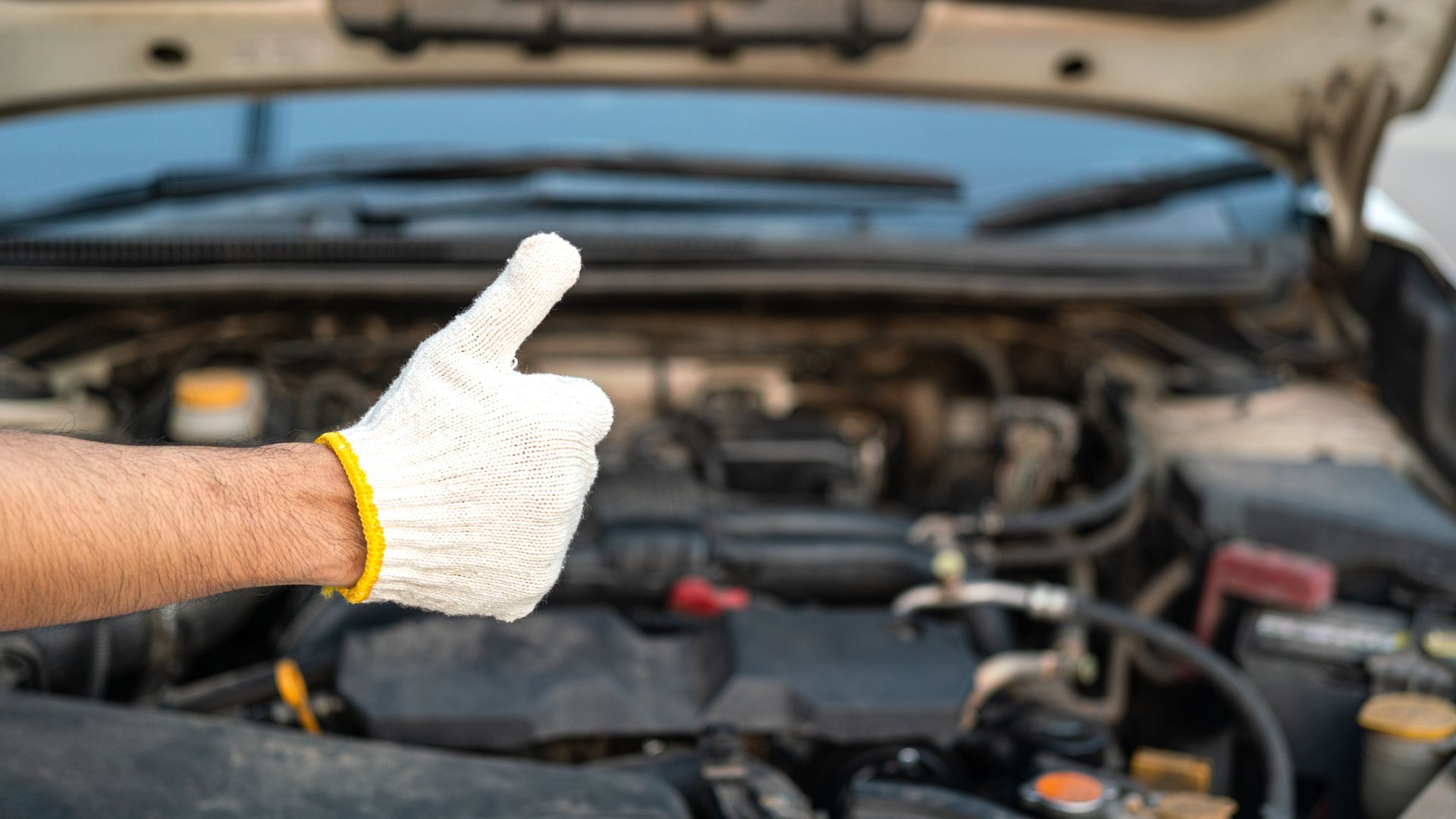
Preventative maintenance isn’t just a buzzword—it’s the reason some vehicles last 250,000 miles and others struggle to make it to 100,000. The idea is simple: take care of small services regularly to avoid big problems later. At Creekwood Tire & Auto Repair in Lenoir City, we help drivers stay ahead of breakdowns by sticking to a basic maintenance plan. It doesn’t have to be complicated or expensive, and in the long run, it saves a lot of money and hassle. What Counts as Preventative Maintenance Preventative maintenance covers a range of services that keep your car running efficiently and help catch issues before they turn into repairs. Some of the most common include: Oil changes Tire rotations and pressure checks Brake inspections Fluid level and condition checks Battery testing Air filter replacements Belt and hose inspections Coolant system checks Transmission fluid checks Suspension and steering system inspections The exact timing of these services depends on your vehicle’s make, model, and mileage. If you're not sure where you stand, we can help build a maintenance plan based on your driving habits. Why It’s Worth It Skipping oil changes, ignoring fluid leaks, or running on worn brakes might save a little time today—but the long-term costs almost always outweigh the short-term savings. Routine maintenance helps prevent: Engine overheating Transmission failure Uneven tire wear Brake system damage Poor fuel economy Sudden roadside breakdowns It also keeps your warranty valid if you’re still under coverage and helps protect your vehicle’s resale value down the line. How to Know When You’re Due A lot of modern vehicles use dashboard reminders, but those aren’t always accurate. The best approach is to schedule regular checks every 5,000 to 7,500 miles. Some items (like air filters or spark plugs) last longer and only need replacement once or twice a year. If your car is running fine but it’s been more than six months since anyone’s looked under the hood, that’s your sign to schedule a service. Preventative Maintenance for Tennessee Driving Conditions Lenoir City and the surrounding areas see all four seasons. That means your vehicle needs to handle temperature swings, rain, and even the occasional snow or ice. These changes can be tough on your fluids, tires, and battery. Checking those components seasonally ensures you’re not caught off guard when weather conditions change or holiday road trips start to add miles. What You Can Expect at Creekwood When you bring your vehicle in for maintenance, we don’t just do the basics and send you on your way. Our technicians inspect the key systems that keep your vehicle running and let you know if anything is showing signs of wear. We’ll never recommend a service you don’t need, and if something can wait, we’ll tell you that too. Final Thoughts Preventative maintenance isn’t just about changing oil—it’s about protecting your investment and keeping your vehicle safe and reliable for the long haul. If it’s been a while since your last check-up, bring your car to Creekwood Tire & Auto Repair in Lenoir City. We’ll help you stay ahead of the wear-and-tear and keep things running the way they should.
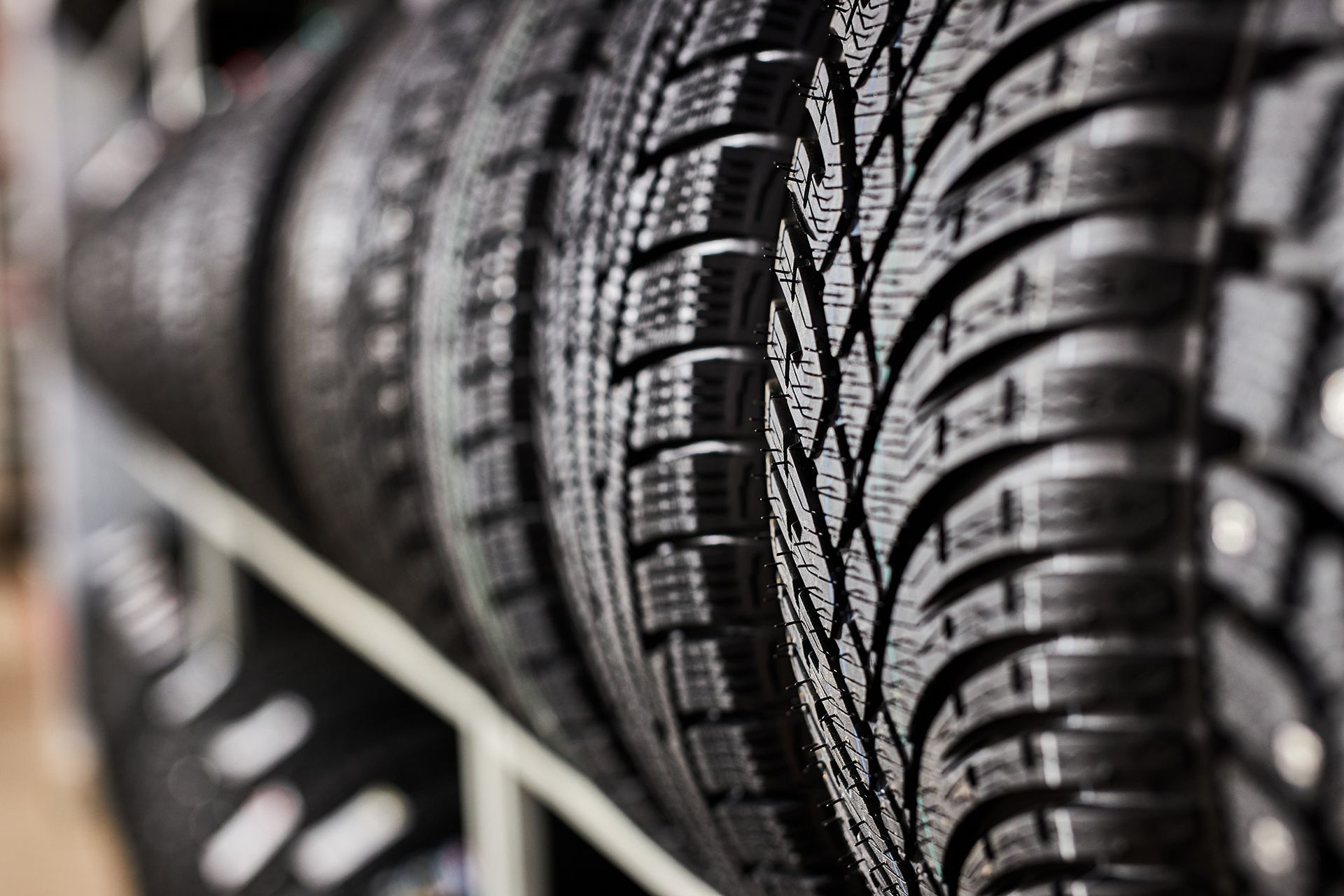
Tires are one of the most important parts of your vehicle when it comes to safety and performance, but they’re also easy to forget about until something goes wrong. A worn-out tire doesn’t always look bad at first glance—but it could be putting you at risk for longer stopping distances, hydroplaning, or even a blowout. At Creekwood Tire & Auto Repair in Lenoir City, we help drivers figure out when it’s time to replace their tires, how to maintain them for longer life, and how to choose the best replacement based on driving habits, road conditions, and budget. Signs You Might Need New Tires It’s not just about tread depth. There are other things to watch for: Uneven wear across the tread Cracking or dry rot along the sidewalls Bulges or bubbles in the tire surface Frequent low-pressure warnings Vibration or thumping while driving Tread depth less than 2/32 of an inch (check with a penny—if you see the top of Lincoln’s head, it’s time) If you're seeing any of these signs, it's a good idea to bring your vehicle in and have your tires checked before something fails on the road. How Tire Maintenance Extends Tire Life A good set of tires should last 40,000 to 60,000 miles, but that depends on how well you take care of them. Routine maintenance makes a big difference. We recommend: Regular rotations (every 5,000 to 6,000 miles) Keeping tires inflated to the proper pressure Having the alignment checked if the car pulls or if tire wear looks uneven Getting your suspension inspected if tires are wearing on the inside or outside edges Small habits—like checking your pressure once a month or not skipping rotations—can add thousands of miles to your tires. Choosing the Right Tires for Your Vehicle and Driving Style There are a lot of tire options out there. Some drivers want long-lasting highway tires. Others need something that grips well in wet weather. Then there are all-terrain or performance options for those who need something more specific. We help drivers pick tires based on real-life driving—not just specs on paper. Factors to think about: Do you mostly drive around town or take longer highway trips? Do you need something built for traction in rain or occasional snow? Is ride comfort or road noise more important to you? Do you tow or carry heavy loads frequently? We carry a wide selection of tire brands and can help match your vehicle to a tire that makes sense for how and where you drive. When Is the Best Time to Buy Tires? Spring and fall are both smart times to check your tires—right before road trip season and before winter weather starts to roll in. But if you’ve noticed handling changes, noise, or reduced grip at any time of year, don’t wait. Driving on worn tires can reduce stopping power and increase your risk of losing control on wet roads. Tire Services We Offer at Creekwood New tire sales and installation Flat repairs Tire rotations Wheel balancing TPMS system checks Tire pressure adjustments Visual inspections for wear and damage We also offer honest advice. If your tires still have life left in them, we’ll let you know. If it’s time for new ones, we’ll guide you through the best options for your budget and driving style. Final Thoughts Tires are easy to overlook until they cause a problem. A quick inspection can give you peace of mind and keep you safer on the road. Whether you need a single tire repair or a full set replacement, Creekwood Tire & Auto Repair in Lenoir City has you covered.
